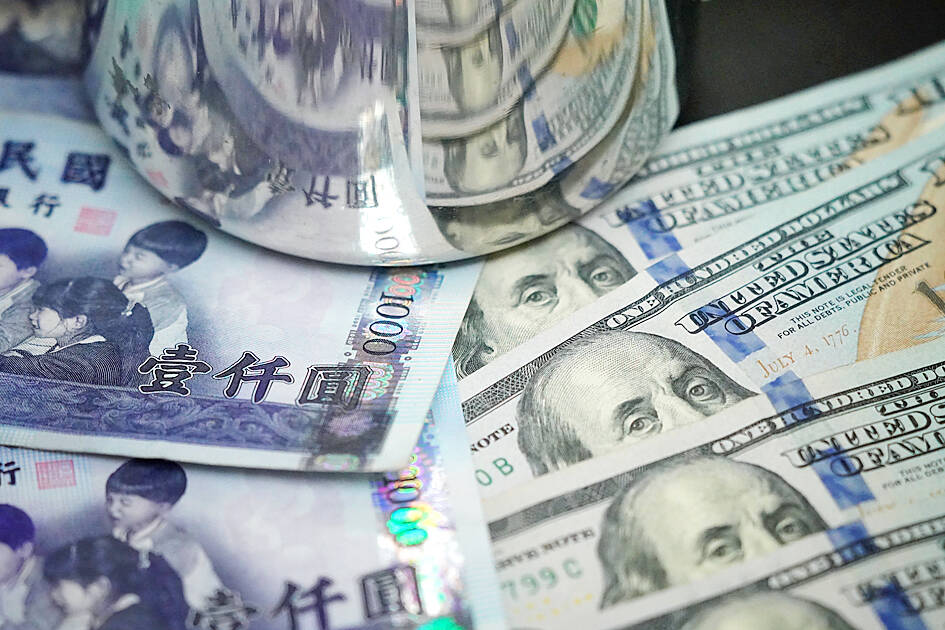Taiwan’s foreign exchange reserves last month slipped by US$1.13 billion to US$577.93 billion, as the central bank intervened a few times to shore up the local currency, the top monetary policymaker said yesterday.
Although the US dollar weakened 1.3 percent against other major currencies, the central bank spotted abnormal fund movements for a few days and waded in to help maintain the market’s stability, Department of Foreign Exchange Director-General Eugene Tsai (蔡炯民) said at a media briefing.
Investors at home and abroad had expected the greenback to lose momentum, in line with interest rate cuts of 50 basis points by the US Federal Reserve on Sept. 18.

Photo: CNA
However, depreciation expectations receded after Fed Chairman Jerome Powell later dismissed the chances of similar cuts for the rest of this year.
US bond yields recently returned to levels that were similar to before the rate cut, Tsai said.
Even so, the euro last month gained 0.77 percent against the US dollar, the pound rose 1.69 percent, the yen picked up 1.64 percent, the yuan increased 1.33 percent and the Australian dollar climbed 1.84 percent, Tsai said.
Capital outflows totaling US$6 billion accounted for the earlier swings in the NT dollar, the official said, adding that foreign portfolio managers wired abroad cash dividends and took profit in local shares, which rallied to relatively high levels last month.
Despite the lackluster showing, Taiwan remained the world’s fifth largest foreign exchange holder after China, Japan, Switzerland and India, Tsai said.

BYPASSING CHINA TARIFFS: In the first five months of this year, Foxconn sent US$4.4bn of iPhones to the US from India, compared with US$3.7bn in the whole of last year Nearly all the iPhones exported by Foxconn Technology Group (富士康科技集團) from India went to the US between March and last month, customs data showed, far above last year’s average of 50 percent and a clear sign of Apple Inc’s efforts to bypass high US tariffs imposed on China. The numbers, being reported by Reuters for the first time, show that Apple has realigned its India exports to almost exclusively serve the US market, when previously the devices were more widely distributed to nations including the Netherlands and the Czech Republic. During March to last month, Foxconn, known as Hon Hai Precision Industry

Taiwan Semiconductor Manufacturing Co (TSMC, 台積電) and the University of Tokyo (UTokyo) yesterday announced the launch of the TSMC-UTokyo Lab to promote advanced semiconductor research, education and talent development. The lab is TSMC’s first laboratory collaboration with a university outside Taiwan, the company said in a statement. The lab would leverage “the extensive knowledge, experience, and creativity” of both institutions, the company said. It is located in the Asano Section of UTokyo’s Hongo, Tokyo, campus and would be managed by UTokyo faculty, guided by directors from UTokyo and TSMC, the company said. TSMC began working with UTokyo in 2019, resulting in 21 research projects,

Ashton Hall’s morning routine involves dunking his head in iced Saratoga Spring Water. For the company that sells the bottled water — Hall’s brand of choice for drinking, brushing his teeth and submerging himself — that is fantastic news. “We’re so thankful to this incredible fitness influencer called Ashton Hall,” Saratoga owner Primo Brands Corp’s CEO Robbert Rietbroek said on an earnings call after Hall’s morning routine video went viral. “He really helped put our brand on the map.” Primo Brands, which was not affiliated with Hall when he made his video, is among the increasing number of companies benefiting from influencer

Quanta Computer Inc (廣達) chairman Barry Lam (林百里) yesterday expressed a downbeat view about the prospects of humanoid robots, given high manufacturing costs and a lack of target customers. Despite rising demand and high expectations for humanoid robots, high research-and-development costs and uncertain profitability remain major concerns, Lam told reporters following the company’s annual shareholders’ meeting in Taoyuan. “Since it seems a bit unworthy to use such high-cost robots to do household chores, I believe robots designed for specific purposes would be more valuable and present a better business opportunity,” Lam said Instead of investing in humanoid robots, Quanta has opted to invest